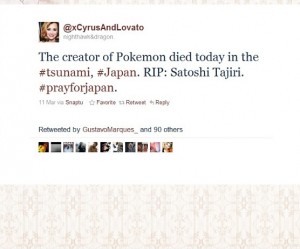 In the wake of Japan’s earthquake and tsunami disaster, a handful of pranksters elected to play on fears and launch hoax tweets, fooling thousands if not millions.
In the wake of Japan’s earthquake and tsunami disaster, a handful of pranksters elected to play on fears and launch hoax tweets, fooling thousands if not millions.
Satoshi Tajiri, the creator of the Pokemon, become a Trending Topic yesterday on Twitter after Twitter user @xCyrusAndLovato tweeted “The creator of Pokemon died today in the #tsunami, #Japan. RIP: Satoshi Tajiri. #prayforjapan.” It turned out to be one of many online rumors, some more harmless than others.
With more and more people are using social media to communicate with loved ones during a crisis (and being advised to do so), it is critical Twitter users do their best to pass on correct information. After all, it’s heartwarming to hear of social media saving lives, but heartbreaking to hear the handful of stories of rescuers being sent off on wild goose chases (most, but not all, crisis tweets are true).
Here’s seven ways the average person can be a good Twitter citizen during a crisis:
1. Only retweet information from Twitter accounts you trust. Only retweet information from accounts or people you know personally or personally trust.
2. Check the timeline. Before you retweet something, check the profile of the account that sent it to make sure an update hasn’t been posted.
3. Check for related tweets. If you a see a tweet from somebody you don’t know about an explosion in, say, Tokyo, find out what other people in Tokyo are tweeting. Chances are if several people are tweeting about the explosion at the same exact time, something’s up. You can safely tweet about the explosion with the disclaimer “Unconfirmed.”
4. Ask people to verify. If you see a tweet from somebody you don’t know reporting about an event the media hasn’t picked up, send out a tweet about it and ask people to verify the information, preferably with a photo.
5. Correct any mistakes. If you discover a hoax or innocent mistake, send out a tweet about it. Use an official retweet from a respected source where possible.
6. Use hashtags wisely. Typically during a crisis, several hashtags (a topic with a hash symbol [“#”] at the start to identify it) appear. For the Japan tragedy, hashtags in use include #Japan, #JPQuake, #JapanQuake, #PrayForJapan, #WeAreAllJapanese,#Tsunami, #Earthquake, and #TsunamiCharity. Using hashtags makes it easier for others to find your tweet in a search on the topic and have your tweet matter. Of course, avoid using hashtags emergency management professionals are using to rescue people (e.g., #J_j_helpme) unless you want to alert them.
7. Keep marketing out. A crisis—as fashion house Kenneth Cole and Microsoft have learned—is not the time to promote your brand or favorite brand. Marketing on the back of human suffering will probably backfire.
Do you agree? Did I leave anything out? Please share your thoughts in the comments section.
When establishing hashtags, keep them as short as possible so as to allow the actual tweets (and retweets) maintain their content/context without forcing retweeters to have to take the time to shorten the message while retaining the hashtags.
When possible, the use of the hashtag #src, followed by the source of the information, is considered a best practice; citing the source of the information helps establish its veracity and allow readers to review and assess the source data.
Project EPIC in Colorado has been doing some great things with crisis related tweets. They’d also encourage the use of the #loc hashtag followed by the location of the report during longer term disasters; this allows mapping of reports.
Good list, and good advice!
Thanks for taking the time to comment on my blog, Gary. Yes, I am a fan of Project EPIC in Colorado and its past and current Tweak the Tweet efforts. Its Tweak the Tweet advice is definitely a MUST for disaster victims trying to use Twitter to get help for themselves, actually way MORE critical than my list above! Thanks again!
I respectfully object to your take a picture advice. People can make the desire to witness an event and post it to Twitter or YouTube the priority rather than calling 911 and staying safe. This type of situation puts local citizens in significant danger from the disaster conditions and doesn’t benefit anybody.
Thanks for taking the time to comment on my blog. You make a great point! I certainly would not advocate endangering your life. I’d only advocate taking a picture if you could do so without endangering your life. As far as 911 goes, calling it before doing anything else also makes a lot of sense. It’s my understanding, however, such systems go down in a major crisis. For example, in the New Zealand quake, the New Zealand version of 911 (111) went down, as did AM radio. So social media was one of the few ways left to communicate. The same thing happened in Japan. That’s why, as noted in my post, the U.S. Department of State was advising people to use social media to contact people in Japan.
My Fox Memphis just learned not to market on the back of human suffering during the #Tornadomageddon2011 (see number seven) It’s #foxstorm hashtag is a case study on how NOT to engage a community.
My brother recommended I might like this blog. He was entirely right. This post truly made my day. You can’t imagine simply how much time I had spent for this info! Thanks!
Holy cow, very nice post!
Thanks, Pamela!
Thank you very much for this article! This information was very usefull for me=)
Thanks for taking the time to comment on my blog!